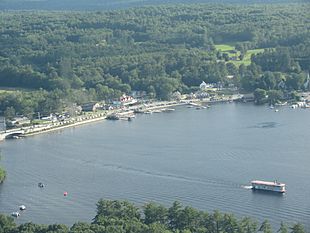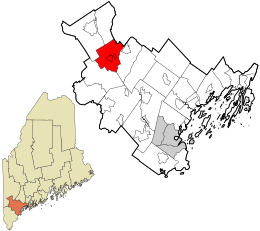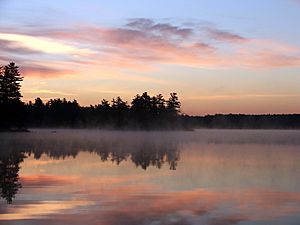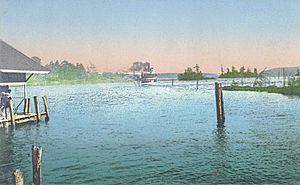Naples, Maine facts for kids
Quick facts for kids
Naples, Maine
|
|
|---|---|

Naples from the air, with the Songo River Queen II on Long Lake and the newly-constructed causeway connecting Brandy Pond
|
|
| Nickname(s):
"The Heart of the Lakes Region"
|
|
| Motto(s):
"Welcome to Vacationland"
|
|

Location in Cumberland County and the state of Maine.
|
|
| Country | United States |
| State | Maine |
| County | Cumberland |
| Villages | Naples Edes Falls South Naples |
| Area | |
| • Total | 37.25 sq mi (96.48 km2) |
| • Land | 31.82 sq mi (82.41 km2) |
| • Water | 5.43 sq mi (14.06 km2) |
| Elevation | 315 ft (96 m) |
| Population
(2020)
|
|
| • Total | 3,925 |
| • Density | 123/sq mi (47.6/km2) |
| Time zone | UTC-5 (Eastern (EST)) |
| • Summer (DST) | UTC-4 (EDT) |
| ZIP code |
04055
|
| Area code(s) | 207 |
| FIPS code | 23-48085 |
| GNIS feature ID | 0582613 |
| Website | Town of Naples, Maine |
Naples is a town in Cumberland County, Maine, United States. It's known as "The Heart of the Lakes Region" because it's surrounded by beautiful lakes. Naples is a popular place for vacations and tourism.
In 2020, about 3,925 people lived in Naples. A part of Sebago Lake State Park is also located here, offering outdoor fun.
Contents
History of Naples, Maine
Early Settlement and Farming
People first settled in the Naples area in 1774. The land was quite rocky, with many large boulders left behind by glaciers. This made farming difficult for crops. However, the higher lands were good for raising livestock like cows. Because of this, hay became the main crop grown in the area.
Becoming a Town and Linking Lakes
The town was officially created on March 4, 1834. It was named after the city of Naples, Italy. Naples was formed from parts of nearby towns like Otisfield and Bridgton. Over the next few years, Naples added even more land from neighboring areas.
A very important project for Naples was the Songo Lock. It was finished in 1832, two years before the town was officially formed. This lock connected Long Lake and Brandy Pond to Sebago Lake. This meant boats could travel all the way from Harrison to Portland using the Cumberland and Oxford Canal. This made it easier to transport goods and people.
Local Industries and Tourism
In the early days, Naples had a factory that canned food and a workshop that made barrels (called a cooperage). People also made carriages, clothes, and shoes in the village.
However, the beautiful lakes and scenery soon made tourism the most important industry. Famous writers like Henry Wadsworth Longfellow and Nathaniel Hawthorne visited Naples in the 1800s.
The Bay of Naples Inn
To welcome more visitors, a large hotel called the Bay of Naples Inn was built. It opened on July 26, 1899, and had 80 bedrooms. The inn was designed by a famous architect named John Calvin Stevens. It faced Mount Washington and the White Mountains, offering amazing views.
The Bay of Naples Inn was a very popular resort in the early 1900s. More tourists started arriving by car after a major highway, now known as United States Route 302, was built in 1919. The inn stayed open until 1951 but was later taken down in 1964 because it was no longer making enough money.
Geography and Water Bodies
Naples covers about 37.25 square miles (96.48 square kilometers). Most of this area is land, but about 5.43 square miles (14.06 square kilometers) is water. The Songo River flows through Naples.
Many important lakes and rivers are in or near Naples, including:
Population and People
| Historical population | |||
|---|---|---|---|
| Census | Pop. | %± | |
| 1840 | 758 | — | |
| 1850 | 1,025 | 35.2% | |
| 1860 | 1,219 | 18.9% | |
| 1870 | 1,058 | −13.2% | |
| 1880 | 1,007 | −4.8% | |
| 1890 | 846 | −16.0% | |
| 1900 | 813 | −3.9% | |
| 1910 | 736 | −9.5% | |
| 1920 | 514 | −30.2% | |
| 1930 | 641 | 24.7% | |
| 1940 | 676 | 5.5% | |
| 1950 | 747 | 10.5% | |
| 1960 | 735 | −1.6% | |
| 1970 | 956 | 30.1% | |
| 1980 | 1,833 | 91.7% | |
| 1990 | 2,860 | 56.0% | |
| 2000 | 3,274 | 14.5% | |
| 2010 | 3,872 | 18.3% | |
| 2020 | 3,925 | 1.4% | |
| U.S. Decennial Census | |||
In 2010, there were 3,872 people living in Naples. The town had 1,579 households. About 30% of these households had children under 18. The average age of people in Naples was about 43 years old.
Arts and Culture
Places to Visit
- Naples Historical Society Museum: This museum shares the history of the town.
Notable People from Naples
Many people who have lived in Naples have gone on to do interesting things. Here are a few:
- Augustus Bove: A state legislator, meaning he helped make laws for the state.
- Richard Cebra: Also a state legislator and once led the Republican Party in Maine.
- Major Knight: A state legislator from the Greenback Party.
- Daniel Merriam: A talented artist known for his watercolor paintings.
- Christine Powers: A state legislator.
- Richard Thompson: A state legislator.
- Mark Walker: A state legislator.
See also
 In Spanish: Naples (Maine) para niños
In Spanish: Naples (Maine) para niños
 | Precious Adams |
 | Lauren Anderson |
 | Janet Collins |







